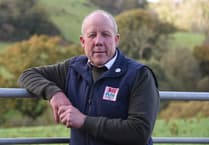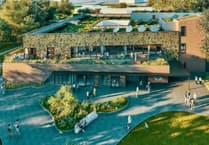Mid and West Wales Senedd Member Cefin Campbell has heard how comprehensive environmental work undertaken on farms–including through cooperation between farmers–has only been possible because of the firm foundation and stability provided through the current basic payment scheme.
That was the clear message from a range of organisations during an FUW Meirionnydd farm visit to Cae Coch, Rhydymain, which is farmed by Alun Edwards.
During the visit, Mr Campbell saw at first hand how a broad range of actions had been undertaken at Cae Coch both by Mr Edwards individually and as part of a group of farmers supported by Parc Eryri National Park and Gwynedd County Council, to improve habitat and carbon sequestration, control, flooding downstream and prevent pollution from the nearby A494 entering the river Wnion.
Speaking after the visit, Mr Edwards said:
“There is no part of the farm where some form of action is not being taken to address environmental issues and deliver public goods, but we do not get paid for this work.
“Where payments are available from the Welsh Government or the National Park, these only pay for materials or costs incurred, so we rely on the Basic Payment to effectively pay us to undertake that work and without it it would not be possible.
“The most important public good we provide is food, and failure to recognise this would be a massive mistake–especially given escalating production costs and the impacts on essential supplies already being felt as a result of the war in Ukraine.”
Mr Edwards said that while Wales’ system of rural payments was going to change–and should change to better meet Welsh goals–it was essential that the current system is evolved into something that retains a ‘stability payment’ that provides genuine income to allow food production and the type of environmental work undertaken at Cae Coch and in the Wnion valley to continue.
“While there is always room for improvement, Wales has an excellent track record of administering schemes and getting payments out on time compared with other countries–especially England–and we also have a state of the art online mapping system that has been working well for almost a decade.
“We do not want to see that good track record jeopardised through reckless optimism about the practicality of running a highly complex and costly to run scheme,” said Mr Edwards.

Cae Coch extends to approximately 735 acres, the vast majority of which is mountain land, with only around 36 acres of fields available to gather silage for winter fodder. The farming enterprise comprises a flock of 500 Welsh mountain ewes with 130 ewe lamb replacements in a closed flock, and 18 Welsh Black suckler cows. All the young stock are sold as stores through Farmers Marts at Dolgellau.
The farm has been in successive environmental schemes and joined Tir Gofal in 2004.
“Most farms in the area continue to participate in these local and national schemes, and there is a great deal more we can do–but we need a solid financial foundation upon which to continue that work,” he said.
Mr Edwards also highlighted the serious implications for farms in the area if the Water Resources ‘NVZ’ Regulations were not reviewed.
“We live in a county where more than 90% of the water pollution is non-agricultural. We have never had a pollution incident here but the tens of thousands that complying with the new rules will entail mean I have to question whether to continue to keep cattle.
“The National Park is extremely concerned that the rules will lead to a further loss of the cattle which are essential for maintaining our upland habitats, leading to species loss, and while I would like to implement a range of ideas to make the farm more environmentally sustainable, these new rules make these impossible,” he said.
Mr Edwards said it was therefore essential that the Senedd acted to review the current regulations in order to make them more targeted to address problems in areas where there is evidence of genuine concern, and that they needed to be more flexible.
Speaking after the visit, FUW Meirionnydd County Chair Edwin Jones said:
“We are facing so much uncertainty due to matters that are beyond our, the Senedd or the Welsh Government’s control: The UK Government is undermining our food and farming industry by striking trade deals with foreign countries, and feed and fertiliser prices have gone through the roof and are now rising further as a result of the war in Ukraine.
“But the Welsh Government and the Senedd do have control over future payment systems and the regulations we face on a day to day basis, whether in terms of what the future Welsh Agriculture Bill looks like, or overhauling the NVZ and bovine TB rules,” he added.




Comments
This article has no comments yet. Be the first to leave a comment.